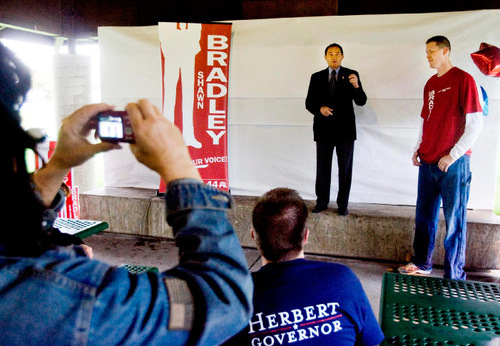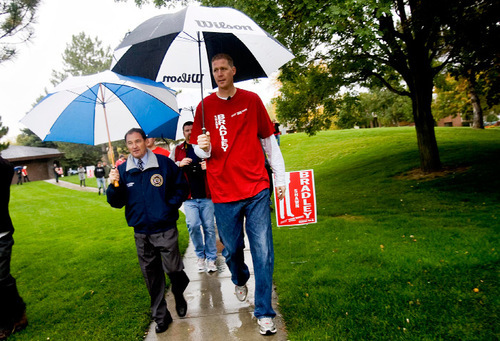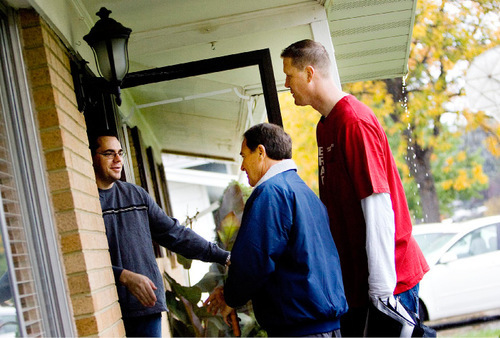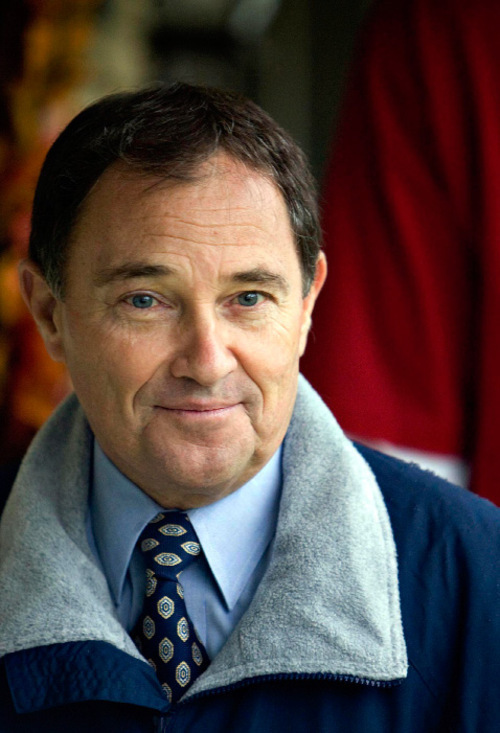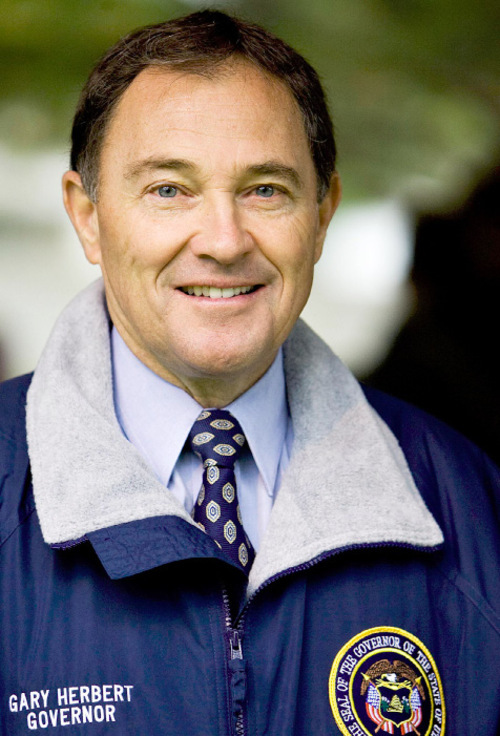This is an archived article that was published on sltrib.com in 2010, and information in the article may be outdated. It is provided only for personal research purposes and may not be reprinted.
Murray • Under dark skies and a steady, cold rain, Gov. Gary Herbert was knocking on doors Saturday trying to give a boost to a guy who has probably never needed one.
Necks craned to look up at Shawn Bradley, the 7-foot-6 former NBA center running for the state House, standing nearly two feet taller than the governor.
At each home along the way, Herbert sang Bradley's praises, telling voters he would be a good pro-business lawmaker and a voice for the suburban district.
Playing a supporting role isn't an unfamiliar spot for Herbert.
For five years, he operated in relative obscurity as No. 2 to then-Gov. Jon Huntsman Jr. That, of course, changed in May 2009, when Huntsman was named as the U.S. ambassador to China.
—
Staying the course • When he officially took office 14 months ago, Herbert didn't offer up a grand vision or new direction for the state. Instead, Herbert said, Utah should stay the course.
Since taking office, that is essentially what Herbert has done. His campaign has relied heavily on a status quo approach and accolades from Forbes Magazine, the Pew Center and others that have praised Utah for its fiscal management.
"Think about it: America is a great place to live, but the best of the best is here in Utah," Herbert said.
So if Herbert wins the election Nov. 2, he says, don't expect any drastic changes.
Philosophically, he favors a limited government and is averse to big new government programs and initiatives. And stylistically, he has shown himself to be more of a manager, focused on working through differences rather than championing his own viewpoint.
It's an approach that Herbert said he learned during his career in real estate, negotiating disagreements between sellers trying to make as much as they can and buyers looking for a deal.
It served him well during 14 years on the Utah County Commission, which favors a team approach.
And, indeed, as governor, his management style favored a string of commissions, task forces, summits and listening sessions.
—
Team approach • "I'm not afraid to have people around me that disagree with me," Herbert said. "I'm very comfortable with my principles that I espouse. I'm comfortable with what my goals and objectives are, and I feel that chances are enhanced for reaching those goals and objectives if I build coalitions."
He created a Balanced Resource Council to handle environmental and land-use issues and an Energy Task Force — made up largely of energy interests — to chart a 10-year energy plan for the state.
He floated the idea of hosting a summit to debate climate-change science but has since jettisoned the idea.
Herbert recruited a broad range of business leaders and former government officials to offer up a plan to streamline government and created a commission of educators and reformers to tackle Utah's school funding problems.
He worked with legislators to cover a $700 million budget shortfall while cutting just $10 million from education and signed bills challenging federal gun laws, land ownership, and health reform..
"In my legislative experience, I've received more calls from this governor than all the others combined," said House Speaker David Clark, R-Santa Clara, "so when he says he reaches out and tries to be inclusive, I would say that's the case."
Even on the most politically perilous issues — immigration, for example — Herbert has tiptoed along a cautious path. In July, he convened a summit of 30 community, business and political leaders to talk about immigration. The governor articulated his guiding principles, but has yet to stake out specific policy positions.
Latino activist Tony Yapias, who founded the group Proyecto Latino de Utah, said he has known Herbert nearly 20 years and knows Herbert values the Latino community, but he finds himself managing a political tempest.
"I think in some ways he's trying to please the right extreme of the tea party so he doesn't become a casualty like [U.S. Sen. Bob] Bennett," Yapias said, referring to Bennett's ouster by a conservative uprising this year. "If the decision was only his to make and there were no commissions or groups outside, I think he would probably take a compassionate approach."
—
Awaiting results • It remains to be seen how effective Herbert's task forces and commissions will be.
Gayle McKeachnie, who was vice chairman of the streamlining commission, said he's not sure whether the group's recommendations will do more than gather dust. And Sen. Howard Stephenson, R-Draper, who is on the education task force, said he has served on numerous such groups that generated good feelings and scant results.
"It's just pathetic to think we can get together one more time and make a difference," Stephenson said, who thinks the Legislature will take the lead infusing market forces into the state's education system.
Matthew Burbank, chairman of the political science department at the University of Utah, said that missing amid all the task forces and the like is a clear sense of where Herbert wants to lead the state.
"I don't get the impression from hearing him speak that he has a vision of what he'd like to accomplish as governor," Burbank said. "It's a little bit of a mystery how he will serve as governor if, indeed, he is elected."
A victory would buy Herbert some breathing room, at least until 2012, when he would have to run again, and it would give him something he hasn't had before: an electoral mandate.
That, said McKeachnie, who was chosen to be lieutenant governor when Olene Walker inherited the governor's office from Mike Leavitt, could give Herbert a sense of freedom to lead.
"I think, with Governor Herbert, he has felt some responsibility or thought it was appropriate that he help carry out the Huntsman plan and legacy," said McKeachnie, who has worked with Herbert for years. "He will, I think, feel a little more free to do his own thing rather than to carry the Huntsman tradition and the Huntsman people." —
Gary Herbert
Age • 63
Family • Wife, Jeanette; six children and 10 grandchildren
Education • Graduated from Orem High School; attended Brigham Young University.
Professional experience • Joined Utah National Guard; started real estate business; ran a day care with his wife.
Political experience • Appointed as Utah County Commissioner in 1990 and spent 14 years on the commission; Ran for governor in 2004; Elected as lieutenant governor in 2004; Assumed office in August 2009 after Gov. Jon Huntsman Jr. stepped down.
Fun Fact • Began playing tennis at age 28 and by age 36 he was ranked No. 1 in the state in the 35-and-over division.


